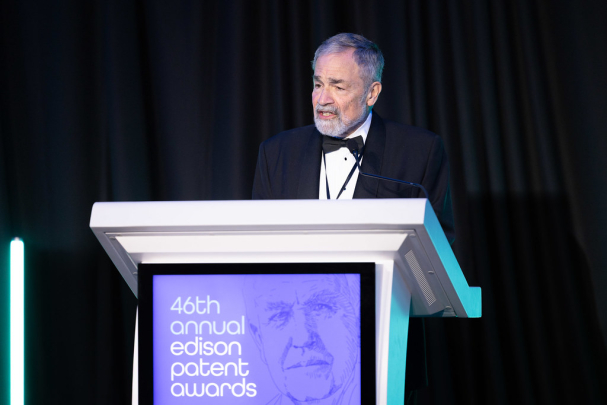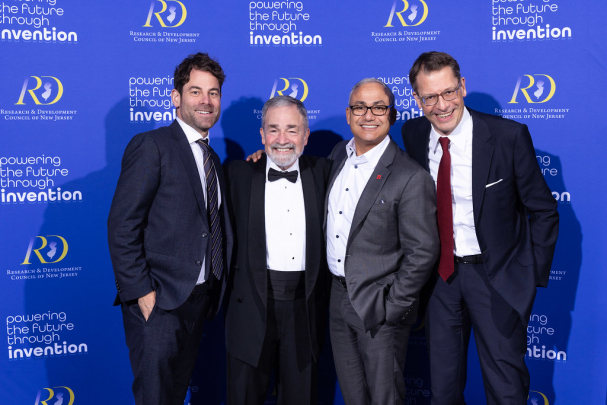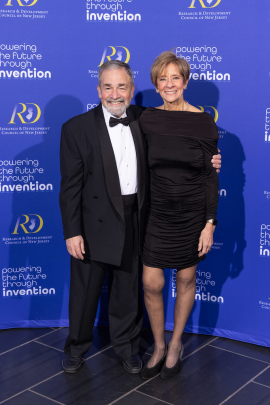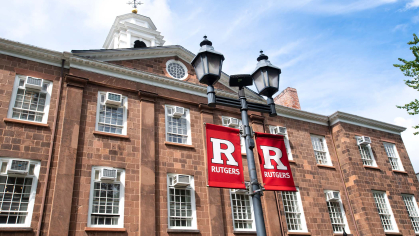For Rutgers Health’s First Chancellor, Mentoring Was the Mission

As Brian Strom prepares to depart an academic health system he helped build and transform, it is the careers he helped shape that matter most to him
When Brian Strom looks back on his years as the first chancellor of Rutgers Health, he could easily point to major achievements – attracting billions in research support or building a top-tier academic health system – as defining his legacy.
But as he readies to leave his post in December after 12 years in the role, Strom said the truest measure of his work lies in the new generation of health care workers and researchers he has guided and mentored.
“Science doesn’t end when our careers end,” said Strom, an epidemiologist and nationally recognized leader in clinical research training. “We need to think about who is going to succeed us, who is going to follow us, who is going to do better than we did. We want people who are smarter and better and trained in different ways to carry the fields to the next stage.”
Since his appointment in 2013, Strom has advised scores of medical professionals, colleagues who have gone on to lead their fields in internal medicine, epidemiology and more. At the University of Pennsylvania, where he was executive vice dean for institutional affairs before moving to Rutgers, Strom mentored more than 40 clinical research trainees.
Science doesn’t end when our careers end. We need to think about who is going to succeed us, who is going to follow us, who is going to do better than we did. We want people who are smarter and better and trained in different ways to carry the fields to the next stage.
Brian Strom
Rutgers Health Chancellor
Strom’s mentoring focus continued at Rutgers. The Chancellor’s Scholars, a prestigious award that Strom founded in 2016, supports two first-year medical school students each year. He also advises a handful of junior faculty members, both with career advice and on research. Over the years, Strom has authored or co-authored more than 650 papers and 15 books, often in partnership with mentees.
Although administrative duties have reduced Strom’s availability in recent years, he still makes mentoring a critical part of his agenda. One of his first mentees at Rutgers, Daniel Horton, an associate professor of epidemiology at the School of Public Health, said having the opportunity to learn from and work directly with Strom profoundly impacted his professional development.
“As my primary mentor since fellowship and a trusted and reliable collaborator over the last dozen years, Brian has, hands down, had a more positive influence on my career than anyone else I've had the privilege to work with,” said Horton, a physician-scientist and board-certified pediatric rheumatologist.
“For someone with the role of chancellor to be so caring, nurturing and supportive of me both professionally and personally, I sometimes have to pinch myself, I've been so lucky,” Horton added.
Creating the space for those engagements was deliberate. When Strom arrived at Rutgers for the fall 2013 semester, there was no mentoring program for faculty. He recalled working to retain a promising young associate professor who was being recruited by the University of Florida. As part of Strom’s offer letter, he promised to “personally mentor” the young man if he stayed in New Jersey.
“When he read the offer letter, he came to me asked, in all seriousness, ‘What's a mentor?’” Strom said. “He’d never heard of it in academic medicine.” When the opportunity was fully explained, the faculty member decided to stay at Rutgers, Strom said.
In the weeks and months that followed, Strom partnered with his new Rutgers colleagues to develop and implement a comprehensive faculty mentoring framework. Every doctor hired would be assigned a senior professor or medical expert to advise their career.
Today, the Rutgers Health’s formalized mentoring program is “a model” for the state, Strom said.
Most of the time, the work of an academic health mentor is to provide basic support – navigating health policy and practice, balancing research demands with clinical work or knowing where to look for funding to become, as Strom puts it, versed in “grantsmanship.”
Every now and then, however, a mentorship becomes something more.
One of Strom’s earliest mentees at Rutgers was Gregory Peck, an associate professor of surgery. After years as an acute care surgeon – the practice of trauma, surgical critical care, emergency general surgery and trauma systems – Peck felt a pull toward clinical research. He began investigating gallstone disease and developing strategies for reducing the incidence of emergency surgery for the condition.
Then, one day, the mentee became the master.
“Ironically, about two years ago, I developed pancreatic gallstone disease, and Greg clinically supported me,” Strom said. “As one of my other mentees joked at the time, ‘Brian, you’re taking this mentoring thing a bit too far, even assuming your mentees’ disease specialty.’”
Peck said he remembers that day as if it was yesterday. Even though Strom wasn’t feeling well, he kept their weekly mentoring appointment as scheduled. But when Strom mentioned his symptoms – severe abdominal pain, several weeks of heartburn and bouts of what he interpreted to be food poisoning – Peck examined him and immediately suspected the very disease he was studying. If left untreated, the condition can lead to sepsis and renal failure.
That evening, Strom was admitted to the hospital for emergency surgery. Peck’s impromptu diagnosis, he said, very likely saved his mentor’s life.
To the Rutgers community, stories of Strom’s mentoring work likely go unnoticed. To most, it’s the chancellor’s broader initiatives that stand out. Hired to manage the historic merger of Rutgers and the University of Medicine and Dentistry of New Jersey, Strom built one of the nation’s most respected academic health centers.
During his tenure, Rutgers Health has experienced unprecedented research expansion, attracting $4 billion in federal funding. Rankings have risen, reputation has increased and new centers, such as the Global Health Institute and the Institute for Translational Medicine and Science, are ensuring that students gain hands-on experience while strengthening New Jersey’s role as a leader in the life sciences.
His most recent recognition was presented on Nov. 20, when he was named New Jersey’s Educator of the Year for 2025 by the Research & Development Council of New Jersey.
Yet to Strom, it isn’t the money, the awards or the centers he opened that will carry him into his next chapter. It is the young doctors and clinicians for whom he always made time every week, no matter what.
“For all that we did building this institution – the integrations, the grants, the buildings, the systems – the heart of my career has always remained the same: teaching and mentorship,” Strom said. “Seeing former trainees become leaders who elevate their entire field, that is the legacy I value most.”




